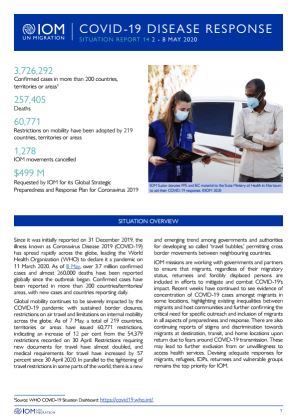-
Countries
-
Data and Analysis
-
Special Focus
-
Crisis Responses
COVID-19 Response - Situation Report 14 (2 - 8 May 2020)

Contact
COVID Response HQ covid19ops@iom.int
Language
English
Location
Global
Period Covered
May 02 2020
May 08 2020
Activity
- Other
Since it was initially reported on 31 December 2019, the illness known as Coronavirus Disease 2019 (COVID-19) has spread rapidly across the globe, leading the World Health Organization (WHO) to declare it a pandemic on 11 March 2020. As of 8 May, over 3.7 million confirmed cases and almost 260,000 deaths have been reported globally since the outbreak began. Confirmed cases have been reported in more than 200 countries/territories/ areas, with new cases and countries reporting daily. Global mobility continues to be severely impacted by the COVID-19 pandemic with sustained border closures, restrictions on air travel and limitations on internal mobility across the globe. As of 7 May, a total of 219 countries, territories or areas have issued 60,771 restrictions, indicating an increase of 12 per cent from the 54,379 restrictions recorded on 30 April. Restrictions requiring new documents for travel have almost doubled, and medical requirements for travel have increased by 57 percent since 30 April 2020. In parallel to the tightening of travel restrictions in some parts of the world, there is a new and emerging trend among governments and authorities for developing so called ‘travel bubbles,’ permitting cross border movements between neighbouring countries. IOM missions are working with governments and partners to ensure that migrants, regardless of their migratory status, returnees and forcibly displaced persons are included in efforts to mitigate and combat COVID-19’s impact. Recent weeks have continued to see evidence of concentration of COVID-19 cases amongst migrants in some locations, highlighting existing inequalities between migrants and host communities and further confirming the critical need for specific outreach and inclusion of migrants in all aspects of preparedness and response. There are also continuing reports of stigma and discrimination towards migrants at destination, transit, and home locations upon return due to fears around COVID-19 transmission. These may lead to further exclusion from or unwillingness to access health services. Devising adequate responses for migrants, refugees, IDPs, returnees and vulnerable groups remains the top priority for IOM.
